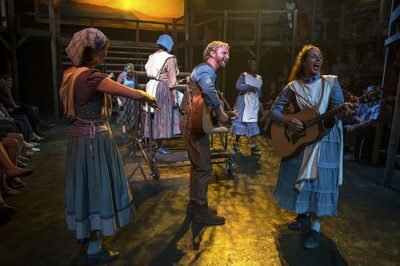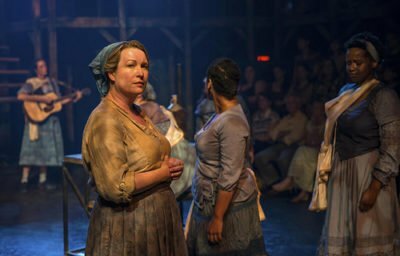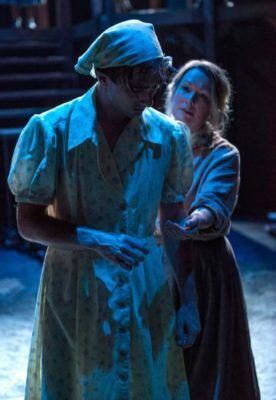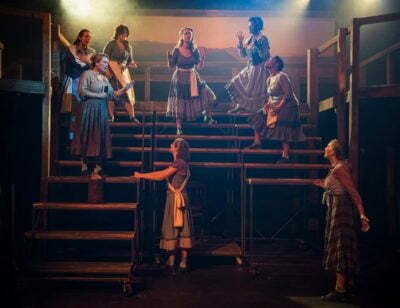The Revel
By Damon Kiely
Music by Jess McIntosh
Directed and Choreographed by Leslie Buxbaum Danzig
Produced by The House Theatre of Chicago
Damon Kiely’s The Revel is an adaptation of The Bacchae by Euripides, but you don’t need to know that to enjoy it. As a good adapter, he took what was good in the original, and by transplanting it, made the story much more relevant to what modern people care about. Again we have a story about worldly necessities in tension with emotional yearnings released only by religious ecstasy, with horrifying, destructive results. But now, the story is human-driven instead of the manipulation of a vengeful deity, and as such, contains much more complex characters. Add to it a highly accurate, sympathetic, and expertly performed representation of Appalachian culture, and the result is another artistic triumph for The House Theatre.

Peter (Chris Mathews) is the visionary despot of a small, backwards coal country town in the 1930s. Having inherited leadership from his father at a young age, Peter devoted himself to making it prosper by opening a clothing factory, and demands that everyone else devote their whole lives to his enterprise as well. Even his mother, Agatha (Sarah Charipar), and sister, Cadie (Christine Mayland Perkins) must work extra hours during quota weeks, the most important of which is just beginning. But at the worst possible time, the factory women desert their shifts to hear the preaching of a traveling deacon (Andy Lutz) in the mountains. While under Peter they have only ever known harsh drudgery, the Deacon offers music, dancing, and love. Even more importantly to the women, he offers redemption. During their meeting, the townswomen confess that they’ve all battled against and sometimes given in to what the Deacon calls “the darkness,” the impulse to take revenge on the world, or just not care about other people.

Unimpressed, Peter dispatches his family to talk sense into the other women. Agatha is just as skeptical as he is, but Cadie wants to join in the revelries. Eventually, Agatha admits that the Deacon’s message resonates strongly with her, and joins in as well. The Deacon’s religion draws heavily from Christianity, and when he tells the women that the drink he offers will lower their inhibitions, he expects this to cause them to experience spiritual fellowship with all other souls, instead of causing a bacchanal. He is neither a Dionysus nor a Harry Powell, and the tragedy that unfolds is as much his as Peter’s and Agatha’s. Lutz plays the Deacon as an earnest man who can’t help but have a strong whiff of shadiness about him. In his opening monologue, he tells us how he used to live in “the darkness,” but now, he’s an instrument of holiness. You don’t have to know the ending to be instantly skeptical.

Agatha’s role, too, is greatly expanded, as evident from her being present throughout the play instead of only showing up at the end, like Agave did in Euripides’ version. Charipar’s performance is that of a resilient woman who is used to repressing both her positive and negative feelings, the latter of which grew stronger over time. When she breaks out of her shell, she is a commanding presence, in stark contrast to her son. Set designer Grant Sabin made a rickety world of scaffolding, and director Leslie Buxbaum Danzig assigns to Peter the job of moving most of the scenery around. It’s an excellent metaphor for how precarious a world he’s built, albeit perilous to stage, and demonstrates that his talent is for logistics, not leadership. Peter has a strange, complex personality: secretive and too disdainful to be concerned about his public image (he hasn’t informed most people that the banks will seize everything if they don’t meet quotas), but reluctant to use force, and willing to intervene personally to protect his enemies. Chris Mathews combines all these facets and his gymnastic training into a fascinating character who is quite different from the Pentheus of Greek tragedy.
A tragedy, whether Greek or modern, also demands strong music, and this is the most pleasurable part of The Revel. Kiely’s musical collaborator, Jess McIntosh, is an instructor at the Old Town School of Folk Music, a specialist in fiddle, and clearly has a deep understanding of country gospel. Under music director Matthew Muñiz, the cast accompanies themselves on guitars, banjo, violin, double-bass, and mandolin. Another Old Town instructor, Barbara Silverman, instructed them in clog dancing, which they do beautifully. Costumes and dialect coaching, by Izumi Inaba and Christine Adaire, likewise contribute to the show’s sense of authenticity. There is also one particular prop used by Agatha at the end of the play which is disturbingly realistic.
 The Revel is an incredibly smart adaptation, and it’s no surprise that it was developed with contributions from the University of Chicago, which is currently in the midst of working with Court Theatre on new translations of other Greek tragedies. I could go on about how well it handles the differences between Christian and classical Hellenistic notions of religion, and the altered intellectual and moral complexities of following through on the contrast between Dionysus and Demeter, the goddess of agriculture and labor, by making the Pentheus-character a stickler who is truly disinterested in whatever the women in the wilderness are doing. But none of that is necessary for enjoying the show. People who don’t like or are intimidated by Greek mythology will find The Revel accessible, transfixing, and to contain a remarkable, talented ensemble. People who know The Bacchae will enjoy how Kiely and dramaturge Derek Matson have expanded its plot to account for changes in religious attitudes. For such a short show, it contains a huge amount of content, and is well worth the investment.
The Revel is an incredibly smart adaptation, and it’s no surprise that it was developed with contributions from the University of Chicago, which is currently in the midst of working with Court Theatre on new translations of other Greek tragedies. I could go on about how well it handles the differences between Christian and classical Hellenistic notions of religion, and the altered intellectual and moral complexities of following through on the contrast between Dionysus and Demeter, the goddess of agriculture and labor, by making the Pentheus-character a stickler who is truly disinterested in whatever the women in the wilderness are doing. But none of that is necessary for enjoying the show. People who don’t like or are intimidated by Greek mythology will find The Revel accessible, transfixing, and to contain a remarkable, talented ensemble. People who know The Bacchae will enjoy how Kiely and dramaturge Derek Matson have expanded its plot to account for changes in religious attitudes. For such a short show, it contains a huge amount of content, and is well worth the investment.
Highly recommended
Jacob Davis
This show has been Jeff recommended.
Playing at the Chopin Theatre, 1543 W Division Street, Chicago. Tickets are $30-35 with discounts for students, industry, and same-day purchases; to order, call 773-769-3832 or visit thehousetheatre.com. Performances are Thursdays-Saturdays at 7:30 pm and Sundays at 7:00 pm through October 25. Running time is ninety minutes.
